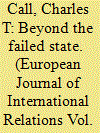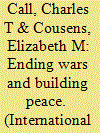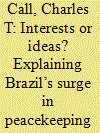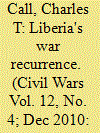|
|
|
Sort Order |
|
|
|
Items / Page
|
|
|
|
|
|
|
| Srl | Item |
| 1 |
ID:
105951


|
|
|
|
|
| Publication |
2011.
|
| Summary/Abstract |
The article advances conceptual alternatives to the 'failed state.' It provides reasons why the concept is deficient, showing especially how counterproductive it is to aggregate states as diverse as Colombia, Malawi, Somalia, Iraq, Haiti, and Tajikistan. I argue for distinguishing among capacity gaps, security gaps, and legitimacy gaps that states experience. Importantly, I show that these gaps often do not coincide in a given country, and that the logical responses to each of the three gaps diverge in significant ways. I offer brief case examples of the logic of response to the gaps and of the tensions that must be managed among them. The article advances the debate over an important and under-theorized emergent concept in global politics.
|
|
|
|
|
|
|
|
|
|
|
|
|
|
|
|
| 2 |
ID:
081986


|
|
|
|
|
| Publication |
2008.
|
| Summary/Abstract |
Scholars and practitioners of international relations have devoted increasing attention to how cease-fires, once achieved, may be translated into sustained peace. In recent years, the United Nations, the World Bank, and the United States and other governments have revamped their institutional architecture for addressing post-conflict reconstruction and peacebuilding. The creation in 2006 of a UN Peacebuilding Commission exemplifies these changes. The relationship between weak states and the durability of peace has acquired new emphasis in IR research. This article analyzes recent conceptual developments in post-conflict peacebuilding, relating them to new thinking about fragile states. It then analyzes the international architecture for addressing post-conflict peacebuilding, identifying gaps, and analyzing likely policy challenges in the near future. We argue that despite important analytic insights and institutional changes, serious challenges persist in efforts to prevent wars from recurring.
|
|
|
|
|
|
|
|
|
|
|
|
|
|
|
|
| 3 |
ID:
163368


|
|
|
|
|
| Summary/Abstract |
Brazil is one of several rising powers that assumed greater protagonism in advancing peace on the global stage and in the Global South beginning in the early 2000s. In places like Haiti, East Timor, Guinea-Bissau, Angola and Mozambique, it expanded its peacekeeping deployments and exercised leadership on peacebuilding issues. What explains this notably increased activity on peace-related issues? In this article, I test four core theories of international relations – realism, liberalism, constructivism and post-colonial theory – to explain the rise and content of these policies in that country. Brazil has been vocal in its non-traditional approaches to peacekeeping and peacebuilding, and this study examines its rhetorical claims through theoretical lenses. It aspires to bring systematic theoretical thinking to a case whose empirics have been used to support each of the four main theoretical approaches. I argue that interest-based theories such as realism and liberalism best account for the emergence of Brazil’s increased peacekeeping and peacebuilding initiatives in the early 2000s. However, idea-based constructivist and post-colonial approaches are necessary to account for the content of these approaches that reflect national identity and social and culturally historic experiences.
|
|
|
|
|
|
|
|
|
|
|
|
|
|
|
|
| 4 |
ID:
158452


|
|
|
|
|
| Summary/Abstract |
Is prevention the answer to escalating violent conflict? Conflict prevention uses carrots and sticks to deter future violence. Its power thus rests on the credibility of policy-makers' commitment to supply the carrot or stick in a timely manner. Unfortunately, there are several political and bureaucratic barriers that make this unlikely. First, it is difficult for policy-makers to sell preventive actions to their constituencies. In contrast with core security interests (like nuclear warfare), an uptick in violence in a faraway, nonstrategic country provides a less convincing call for action. Second, preventive decisions are difficult to make. Decision-makers are predisposed to avoid making difficult decisions until a crisis breaks out and they are forced to act. Third, preventive actions are political, not technical, requiring the use of precious political capital for uncertain outcomes whose success may be invisible (manifest in the absence of violence). Perhaps, if decision-makers are able to overcome these obstacles and make more credible commitments to conflict prevention, then conflict prevention will become a more credible solution to violent conflict.
|
|
|
|
|
|
|
|
|
|
|
|
|
|
|
|
| 5 |
ID:
082154


|
|
|
|
|
| Publication |
2008.
|
| Summary/Abstract |
What constitutes a successful peacebuilding outcome? This paper identifies four common standards for peacebuilding success and explores them conceptually and operationally. War recurrence, the most salient marker of peacebuilding failure, is a necessary but insufficient indicator. Yet other standards are also problematic. This paper argues for a standard that includes (a) the recurrence of large-scale organised violence, plus (b) political and institutional elements that minimally indicate a state capacity for resolving social conflicts peaceably. Even as better cross-national indicators of institutionalising peace are needed, national and international decisionmakers should interpret any such standards with caution and in ways that are highly context-specific in developing policies.
|
|
|
|
|
|
|
|
|
|
|
|
|
|
|
|
| 6 |
ID:
101341


|
|
|
|
|
| Publication |
2010.
|
| Summary/Abstract |
Scholars of peacebuilding are increasingly moving beyond questions of how to reach negotiated settlements to how an apparently stable postwar peace can be consolidated. Liberia offers a good case study, as its civil war of 1990-96 seemed to have concluded with an internationally supported election in 1997 and the withdrawal of international peacekeeping forces. Yet it experienced renewed warfare involving many of the same actors by 2000. What explains the failure of Liberia's peace? Recent research on civil wars has emphasized the causal role of poverty, natural resource dependency, and weak state institutions. Although Liberia reflects many of these factors, I argue here that grievance and exclusionary behavior underlie Liberia's civil war recurrence. These findings suggest that national actors and international peacebuilders should focus strategies on addressing postwar elected governments' exclusionary conduct toward former enemies.
|
|
|
|
|
|
|
|
|
|
|
|
|
|
|
|
| 7 |
ID:
150979


|
|
|
|
|
| Summary/Abstract |
During his campaign, Donald Trump pledged a “very swift and decisive end” to nation-building if elected.
|
|
|
|
|
|
|
|
|
|
|
|
|
|
|
|
|
|
|
|
|